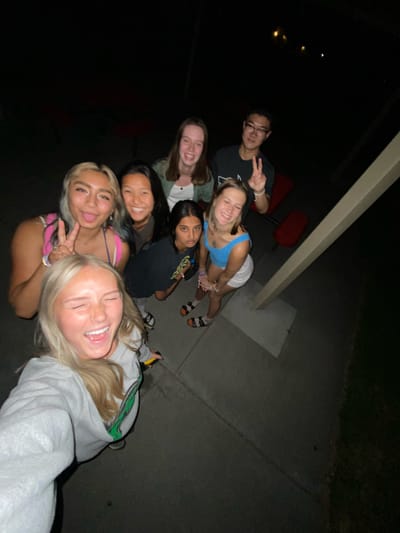Reflection: Junior Year

Today was my last day as a junior. Out of all the years I’ve been alive, I’ve grown the most this year, both personally and academically. I’d like to share what I’ve learned in hopes that it’ll help someone.
🪞 Social/Personal
(1) “He who has a Why to live for can bear almost any How.” —Friedrich Nietzsche
I heard this quote from reading Victor Frankl’s Man’s Search for Meaning. (Very good book, by the way.) I find it to be true. As long as you know why you’re living, you can face almost any challenge that comes your way.
And even if you don’t know your Why, it’s only rational to persevere. Just because you don’t know your Why doesn’t mean it’s inexistent. Continue dogmatically and find it out.
(2) You’re not alone.
It’s really easy to feel alone, but it’s hard to remember that you’re not. Even though your experience may be unique, you’ll always have people that care about you. It’s a matter of whether or not you’re receptive to their concern.
Be receptive—don’t isolate yourself.
(3) Cherish them before they’re gone.
Some of my friends are seniors, which means they’re leaving by the end of this summer. They’re leaving. By the end of this summer. I never thought “the end” would be so near, but now that I’m a couple of months away from it, I’m scared.
I wish I had spent more time with them. I can’t turn back time, so I might as well turn it into a lesson. When you have people that you hold dearly, hold them, and hold them dearly. In this case, I know when they’ll leave. I also know that many aren’t as lucky as I am. Regardless, don’t pretend life is infinite because you’ll have to face reality when they’re no longer part of it.
Okay, I know I’m being dramatic. It’s not like I’m severing all contact with them, but you understand the point.
(4) Read.
The only New Year’s resolution I’ve ever set was to read a book each week, and it’s the best resolution I’ve set (Albeit I haven’t stuck to it, but the intention is there). I was inspired by John Fish’s video on reading a book every week. In another video, he explains the benefits of reading, so I won’t go over that.
I will quickly say, though, that reading has helped me focus more than I ever have been, expanded my vocabulary, and made me less ignorant. I think it’s a good hobby that everyone should have, regardless of how “busy” you are.
(5) You never know what someone else is going through.
As the adage goes, treat others how you want to be treated. Or even better, just be nice to people. You never know what someone is going through, and it becomes ever more apparent in high school. No matter how “put together” someone seems, they’ll always be struggling. Why add to someone’s plate when it’s already full?
(6) Sit on it.
I’m quite an outspoken person. If you’re more reserved than I am, you might already know this lesson. Regardless, I’ll still share it for all of the doofuses like me: If you’re ever unsure about saying or doing something, don’t; do something else and then revisit it.
Often, when something like that happens, it’s because you impulsively want to do something, but logically, you know it’s not a good idea. So, take advantage of your emotion’s impermanence and act on it later.
(7) Adults are people, too.
I’ve been raised on the idea that children must respect adults and mustn’t talk to them unnecessarily. As a result, I’ve had a hard time talking to adults. Over this year, I’ve learned that they’re just people. They’re not perfect, omniscient, and mature. They can be, but not necessarily. Everyone’s just another person trying to live. There’s no reason to be afraid of adults.
❤ Relationships
I decided to separate this part with breakups, even though breakups are a subset of relationships, because they’re inherently different—relationships divert your attention to someone else.
(1) If they cared, they would.
If someone cares about you, they’ll go to hell and back for you. That’s just the truth. Here are two examples from my relationship that taught me this lesson:
(1) At the beginning of our relationship, she was in Texas for Thanksgiving break. Each night, she would leave the board games her family was playing and text me for 1-2 hours. At the end of our relationship, during Christmas break, she told me she couldn’t talk because she had to play board games.
(2) One day, after school, I got a bit worried because she hadn’t responded to my texts in a few hours. Nonetheless, I knew she was a busy person, so I chose to do homework instead of overthinking. Later, to my surprise, she emailed me explaining that her phone was taken away. We emailed for an hour before going to bed.
So, if you’re wondering if your crush likes you or whatnot, I’m sorry to say that they most likely don’t. When someone wants to care for you, they’ll show it. (Yes, I know there are exceptions to the rule.)
(2) It doesn’t matter if you don’t know what you’re doing.
If you’re with the right person, it won’t matter if it’s your first time in a relationship or if you don’t know what you’re doing. They don’t care. And if they do care, you’re not with the right person. You shouldn’t have to be someone you’re not, especially with the person you care about the most.
(3) Balance your time.
It’s really easy to spend time with only your partner when you’re in a relationship. I had this problem at the beginning of mine. It’s important to remember that your partner and friends should be of equal standing. Don’t neglect one for the other.
💔 Breakups
Breakups suck.
And it’s not even like my first relationship lasted that long—a solid 1.5 months. Nonetheless, it hurt like hell. I think I had unreasonably high expectations for my first relationship: one of my friends has been in a relationship for 1.5+ years, media is enamored by the idea of your first love being your last, and I have a “weird thing” about firsts. So when everything came crashing down, I was shocked.
I always thought I was “different.” Maybe other high school relationships would last a couple of months, but mine wouldn’t. They’re emotionally immature and shallow. “I’m not” and I didn’t think she was (she isn’t, I’m just bitter).
But the average is the average: it’s the most typical case of the aggregate. So, in reality, it shouldn’t be surprising to hear 1 month, 2 weeks, and 4 days as the length of it all (we didn’t even hit 2 months which is kind of unfortunate, but I digress).
Of course, there’s a lesson in all of the hurt. In fact, there are quite a few:
(1) You’re a puzzle piece.
Our relationship did not end because she was “immature and shallow” or whatever petulant description I wanted to chalk it up to. Instead, we simply didn’t fit. No matter how, in some aspects, similar we were, the differences became incompatibilities—and you can’t “fix” those incompatibilities. You are who you are, and they are who they are. When the puzzle pieces don’t fit, you don’t cut them up or add parts to make them fit. You look for other pieces and pair them up.
I quite like this puzzle analogy, too. In the grand scheme of things, we’re all just puzzle pieces that fit together to form our universe. That’s a bit of a different discussion, though.
(2) There are other doors for you to open.
A sort of mentor of mine used a door analogy to describe how we spend our energy and time on various things.
Colloquially, I couldn’t get over her. In the analogy, I spent too much time looking through her door frame to watch her open her other doors as I left mine closed. Instead of opening Door 1 and putting my energy toward plants, I peered through her door to watch her open her Door 1 and become closer with a friend. Instead of opening Door 2 and exploring more mathematical ideas, I watched her open her Door 2 and achieve goals in her favorite extracurricular.
You get the point. Eventually, her door will close, and I will no longer be able to see what she’s doing. But why even care? At some point, I have to step away from her door and leave it alone. No knocking, no loitering, no peering. Might as well get a head start.
(3) Emotions are a sine graph.
Or cosine. Take your pick. It doesn’t even have to be the parent graph. Change its amplitude, phase shift, period, or whatever you’d like.
The point is, as my friend says, “It’s not linear.” For some reason, I expected every day to be better than the last. Time and hurt should be inversely proportional! Except it’s not. There will be good days, and even weeks, but those may be followed by bad ones. It’s not necessarily a sign of regression. Rather, it’s a sign that you’re human and your emotions aren’t some simple linear equations.
(4) Be okay with not being okay.
Bad days are inevitable, but as long as you keep trudging forward, no matter how hopeless it seems, it will get better. Life shouldn’t be easy (read Storyworthy by Matthew Dicks), and that’s okay. Be okay with crying, taking time for yourself, and reflecting. Most importantly, don’t compare your “progress” with others’. Just because they got over their breakup in 2 weeks doesn’t mean you can or have to.
(5) Don’t try to use reason to explain emotions.
She told me why she broke up with me, but I was unsatisfied. I went out to “discover” why she truly decided it was over, but it doesn’t really matter. As long as you’re absolved of crimes against their heart—as long as you gave it your all—there’s not much to reflect on. It goes back to the whole puzzle piece idea.
In the end, they might not even know why they did it or be confident in their decision. Regardless, it already happened, and you don’t need to trace their steps to find out how they got there. Instead, focus on bettering yourself and enjoying life.
(6) You need someone.
When you have a breakup, you need someone to talk to (unless it doesn’t bother you the slightest, which I’d ask: why were you in a relationship with them in the first place?). You cannot convince yourself that you’re in this alone. I know that no one else knew them like you did, but you still need to express what you’re going through. You’re never alone—you just have to make sure you’re looking around.
(7) Communicate.
Originally, when I wrote this, it was pointed—I was still bitter about what had happened.
All that needs to be said is that you should communicate, especially in times of hardship, because others cannot read your mind. It seems like an obvious statement, but I think we forget it sometimes.
(8) Don’t rush it.
I proclaimed that I was over her twice. Both times, I quickly realized I had lied. Breakups suck, and so does the subsequent pain. Lying to yourself, however, doesn’t get you past the pain. As Robert Frost said, “The only way out is through.”
(9) Stop thinking about it.
This doesn’t apply to the whole healing process. Toward the latter half, however, you need to stop thinking about it. Stop thinking about what could’ve been, what you could’ve done better, why they did X, why they didn’t do X, how it was better back then, etc. You’re putting yourself through more than you need to.
Also, stop caring about them. I know it’s hard to do, but unless you continue to be friends (why subject yourself to that?), it’s not your job to care about them anymore. If they wanted you to care, they should’ve kept you around. It’s their loss, not yours.
📝 School
(1) Don’t be afraid to quit.
The word “quit” has a negative connotation, especially in hustle culture. In many cases, quitting is bad. In some cases, however, you shouldn’t be afraid to quit.
I’ve been on my school’s debate team since I was a freshman, and it was a big part of my life. This year, I realized there are more things I want to dedicate my time and energy to. I felt like I was going to let down all of the camp leaders and debate mentors I’ve had, but at some point, I had to choose myself.
It’s okay to quit a commitment when it improves you as a person.
(2) Start studying sooner.
There’s not much to say for this one. Just start studying sooner for APs. Give yourself at least one month to study.
(3) Use the Pomodoro Technique.
I’ve known about the Pomodoro Technique for a while but didn’t really commit to it until this year. It’s a really good way to study.
The idea is that 1 session consists of a 25-minute study period and a 5-minute break. Do 4 sessions, and on the 4th, take a 10-20 minute break instead of the 5-minute break. Then, repeat as necessary.
Some people like to have 1 session as a 50-minute study period and 10-minute break. Either way, it’s still a great technique. Personalize it to what you’re most productive with.
(4) Princeton Review is too hard.
For most courses, Princeton Review’s practice exams are excessively hard, and reading the book isn’t worth it. College Board’s AP daily videos and progress checks can give anyone a 5, even if they’re self-studying.
No spam, no sharing to third party. Only you and me.






Member discussion